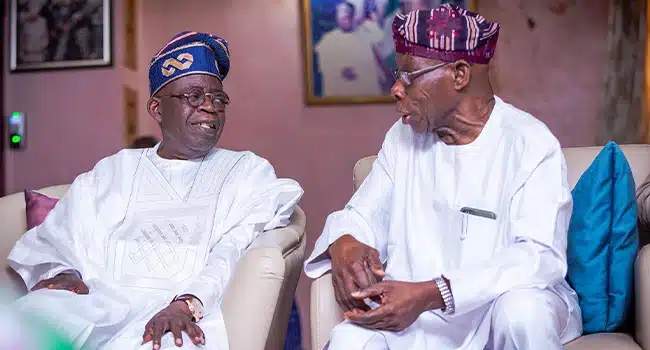The Olugbon of Orile-Igbon, Oyo State, Oba Francis Alao, has called on former President Olusegun Obasanjo to stop portraying himself as a saint. This statement comes days after Obasanjo criticized the moral integrity of Nigeria’s current political leaders, asserting that many should be imprisoned.
Obasanjo, speaking in Abeokuta while hosting members of the House of Representatives, suggested that Nigeria’s progress was hindered by the unethical behavior of its leaders. He proposed reforms such as a single six-year presidential term and the rotation of governorship among senatorial districts but emphasized that such changes would be futile without a shift in the character of those in power.
In response, Oba Alao, who also serves as the Vice Chairman of the Oyo State Council of Obas and Chiefs, stated that Obasanjo should not exclude himself from the category of corrupt leaders he criticizes. The monarch pointed out that Obasanjo’s administration (1999-2007) spent billions of dollars attempting to fix Nigeria’s power supply, yet the efforts yielded little to no results.
“Chief Obasanjo cannot wash his hands clean of all activities that brought Nigeria to this undesirable state. Doing so will amount to a pot calling the kettle black,” Oba Alao remarked. He urged Obasanjo to set an example by submitting himself to the Economic and Financial Crimes Commission (EFCC) for investigation.
Additionally, the deputy spokesperson for the House of Representatives, Philip Agbese, criticized Obasanjo for claiming that National Assembly members fix their salaries and are bribed by the executive branch. Agbese defended the current Assembly, asserting that it operates with greater transparency and accountability than during Obasanjo’s tenure as President.
Agbese also refuted allegations that the current administration had bribed legislators, stressing that President Bola Tinubu’s leadership style is characterized by diplomacy and consultation rather than coercion or bribery.
He contrasted Tinubu’s approach with Obasanjo’s, noting that Tinubu respects the autonomy of the legislative branch, which has fostered a more productive relationship between the executive and the National Assembly.




